Dalek
– Adam was saying that all his life he wanted to see the stars.
– Tell him to go and stand outside, then.
After the silly fun of the two previous episodes (and yes, I know they did touch on more serious matters, but they nearly drowned in the sea of silliness) we have a much more heavy one. At the risk of being monotonous, I’ll say that we’ll have yet to wait a bit for my personal favorite of Series 1, but I have to admit that “Dalek” has a strong story. My main disappointments here (and I’ll start with them just to get them out of the way so that we can concentrate on the good stuff) are: flat characters (especially van Statten, but also Diana Goddard and Adam Mitchell), a bit less than stellar music (the main piece of the episode, appropriately entitled “The lone Dalek”, is ok, but not the best of Murray Gold’s creations), and the title, spoiling the nature of the main antagonist (one of the working titles was The creature of lies, which would be better, but simply Metaltron would have also worked, as would, for example, The survivor).
Let us now move to the strengths of this episode.
I'm the only one left. I win. How about that?
Probably the most obvious one is the big reveal that the Doctor is the one behind the death of the Time Lords (and Daleks). We don’t have any specifics – that event will be alluded to in 54 episodes and explored in more detail in 96 episodes (!) – but we know that the Doctor “made it happen”. There is some really powerful storytelling here – the information about the Time War trickles very slowly, starting with the first episode, and culminates here. (In fact, if I am not mistaken, the very next moment when the Time War is discussed will be in spoiler for series 3 Gridlock.)
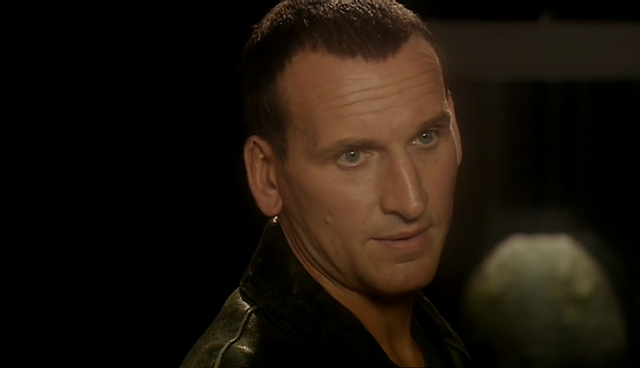
Sometimes winning… winning is no fun at all. – spoiler for series 5 The Eleventh Doctor
It is almost banal to say that “winning” is not – should not be – the main goal of many activities. There is a meme – funny and sad at the same time – where a man is shown to lie in a sleeping bag on the porch of his house, and the caption says “A husband is resting after winning an argument with his wife”. Granted, there are situations when you strive to win - but quite often in life, what “winning” really means is compromise and sometimes even resigning. To put it in other words, the cost of winning is sometimes higher than the reward. And marriage is far from the only example, although I would argue that many if not most examples are in some way related with relationships. I am neither experienced enough, nor wise enough, nor qualified enough to pretend to be an expert on this, but I think one of the reasons it works this way is that “winning” often means “defeating the enemy”, and in relationships, my “enemy” is usually myself. As St. Paul puts it, “For our struggle is not with flesh and blood but with the principalities, with the powers, with the world rulers of this present darkness, with the evil spirits in the heavens”. Even if you’re not Catholic, I do encourage you to read at least Eph 6:10-17 – not only is it the Word of God, it is also most beautiful writing. And yes, there are situations where the right fight is the external, physical one – maybe even with a literal gun (spoiler for series 7though probably not with the Moment) – but most often than not, the real fight is spiritual, not physical.
The Doctor’s mirrors - Adam, van Statten, the Dalek
Probably the best thing about Dalek is how the three characters introduced in the story – Henry van Statten, Adam Mitchell and the Dalek – mirror different qualities of the Doctor. It is as if Rose had the unique opportunity to see what the Doctor could become if one of his character’s features took over and became his defining one.
The first of the three – and the least obvious as the Doctor’s counterpart – is Henry van Statten. He is cynical and ruthless, much like the Doctor – the differences being that van Statten is cynical and ruthless towards everyone, and that the Doctor has other qualities which keep his cynicism and ruthlessness in check. Van Statten is also full of conceit – again, much like the Doctor – and it is actually pretty funny to see how the Doctor is annoyed when he has to taste his own medicine. Take the Doctor, remove his guilt, conscience and empathy, dial down his appreciation of the wonders of the universe, and you end up with van Statten…
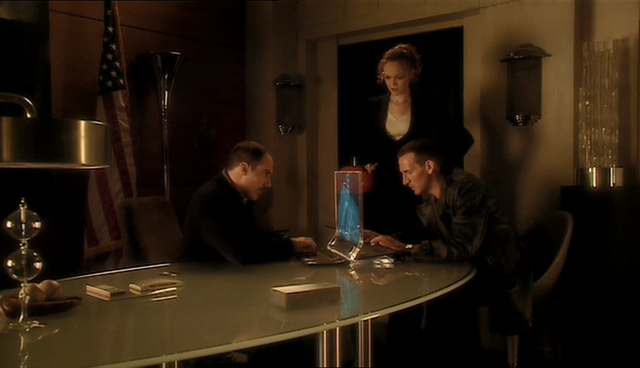
– It's years since I had to work this fast!
– Are you enjoying this?
As for Adam, his similarities to the Doctor are much more obvious and even clearly stated by Rose. Like the Doctor, he is brimming with vanity, and like the Doctor, he is not a cynic (though unlike the Doctor he seems to going in that direction), and it is probably because of that that he can still be in awe of the cosmos. Again, he is basically what the Doctor could be if not for his responsibility for Rose and heavy PTSD (well, also the T.A.R.D.I.S. – while Adam wants to travel and see the stars, the Doctor is actually able to do that).
And finally, the Dalek. The connection it shares with the Doctor is painfully (both for the Doctor and for the viewer) obvious. This is the first time (at least in New Who) when the Doctor’s hate for the Daleks emerges – but far, far from the last time. There isn’t much to say here – everything about the relationship between the Doctor and the Dalek was said in the episode itself. They are both the last of their kind, and they both deeply hate each other. Interestingly, it is the Dalek who seems to change first, with a bit of help from Rose. This is an important point – it is so much easier to become better with the help of other people… We also get the first glimpse of what the Doctor can become when he loses his companions, a topic which will be hinted at in spoiler for series 4 Turn left and in spoiler for series 7 A town called Mercy and explored in spoiler for series 4 The waters of Mars. (A technical side note: when hiding the spoilers, I assign specials to series in a slightly arbitrary, but hopefully reasonable way.)
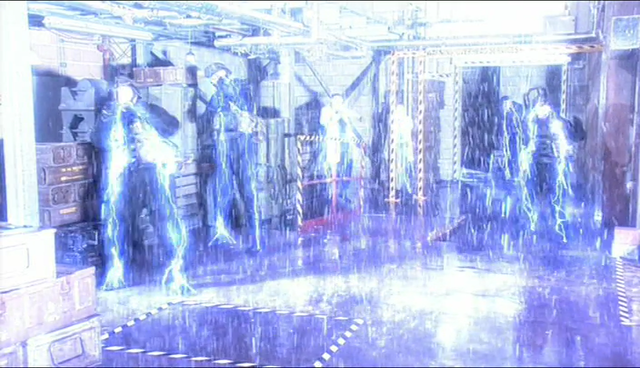
Water and electricity – bad mix! – spoiler for series 4Time Lord Victorious, who apparently became more Dalek-like than he would like to admit
Is Rose a mother now?
The relationship between Rose and the Dalek, though, is a different one. Two episodes ago I was discussing how mothers tend to forgive their children everything, and how Rose was seemingly not aware of this. Well, given that Dalek got part of his DNA from Rose, she is in a way a motherly figure for it now. This is far from a perfect analogy – after all, it was her who ordered the Dalek to kill itself, which is about as un-motherly as you can get – but still there is an interesting parallel here. It was Rose who argued with the Doctor not to kill the Dalek. In fact, she tried really hard to find a good reason for the Doctor to spare the creature. This is exactly what a mother would do! Sadly, the Dalek itself had no qualms about using Rose to blackmail the Doctor into releasing it.
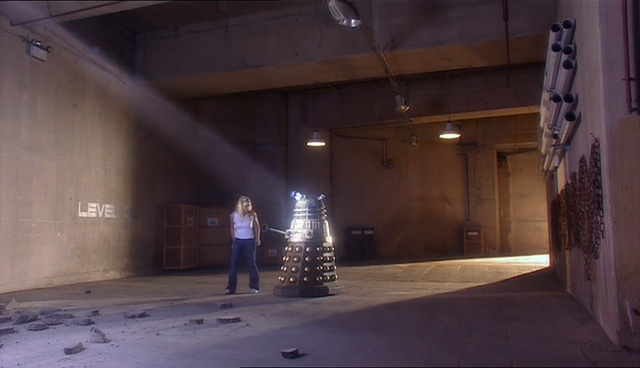
What difference would one good Dalek make? – spoiler for series 8 Clara Oswald
Show me your friends, and I'll show you your future
Another memorable thing was how van Statten poisoned his surroundings with his attitude. It is clear to me that Diana Goddard was not much better – even if she showed human feelings once in a while, she was as ruthless as him. I would argue that Adam Mitchell was also in the process of becoming a worse version of himself. Even the commander of van Statten armed forces (who was alive for maybe a few minutes of screen time and obviously not working directly with van Statten) was unbearably smug when telling the Doctor that he “thinks he knows how to fight one single tin robot”. This is a sad truth about humans: we tend to mimic people we are surrounded by, and staying different than the ones around us, while possible, takes a lot of strong will and hard work. Well, I say “sad” – but in fact, knowing this, we can take advantage and do our best to spend time in company of people better than us so that we can be pulled upwards instead of downwards. Not that it happens automatically – we still need to fight the battle with ourselves to become better people – but making it easier using psychological tricks like this seems to be wise tactics. On the other hand, one needs to be careful – actively avoiding people with lower moral qualities is not something I would recommend, either, for two reasons. One is a simple logical (even if made a bit jokingly) observation – if everyone only wants to spend time with someone better in some respect, those very “better” people wouldn’t allow it, for the same reason – so that someone else doesn’t drag them down! But the second one is much more serious. Judging other people’s characters – and especially judging them as worse than yours – is itself character-corrupting as it leads to pride.
So, what to do if you want to become a better person? I’m not really qualified to advise anyone how to become better, but this is probably what I would do. Try to spend some time with people you admire and aspire to be like, but do not reject people even if you think are “worse” than you in some respect. Instead, find an area they are better than you in and keep yourself humble. (By the way, let me mention that that was exactly what the Doctor did in Dalek – when Henry van Statten was good in playing the alien instrument, he received a genuine praise from the Doctor!) More importantly, devote some time to spend with the one Person which is better than anyone, and pray regularly, also for everyone you interact with. Simple as that. (“Simple” not meaning “easy”, of course.)
Last but not least
I think that the scene when the Dalek asks Rose, how the sunlight feels, with just a touch of envy – after all, being locked in a metal case does not give it many chances to experience the beauty of nature – is quite touching, and it did evoke a bit of empathy for the Dalek. And this is another important lesson, at least for me. It is one thing to condemn actions of people who do wrong things, but it is another to have compassion and understanding for them. Note that understanding why they commit evil is entirely different from justifying it! Also, one thing I strive to remember and hope to teach my children is that when someone harms another person – no matter how much – they always harm themselves this way, too, and always deserve sympathy. And to stress it again – this does not mean justifying any crime, or saying it should not be punished, or even that the punishment should be less severe because of that – this just means understanding that the perpetrator is also one of the victims.
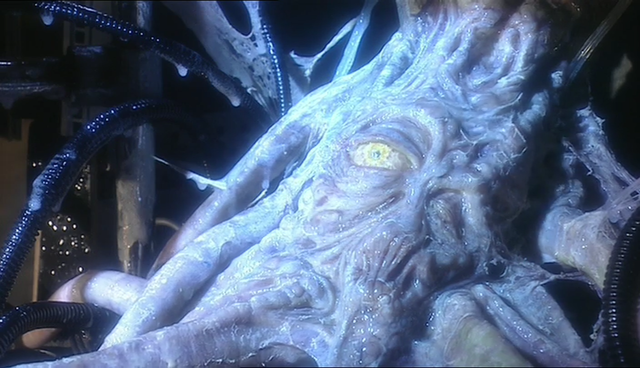
I it a killer? Is it a victim? It’s both.